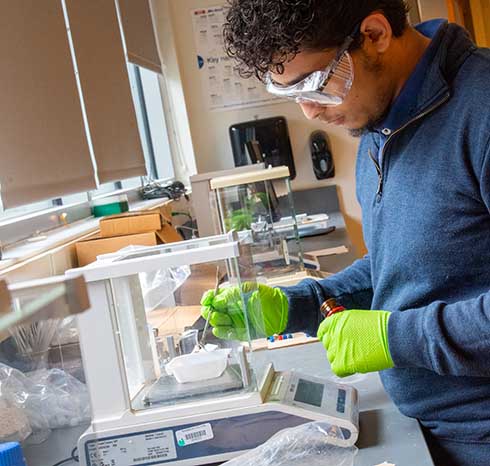U.S. National Science Foundation and Micron award Nazareth $1.2 million grant
The U.S. National Science Foundation Robert Noyce Teacher Scholarship program and the Micron Foundation have awarded Nazareth University a $1.2 million grant— one of just four grants nationwide — to advance science, technology, engineering, and math (STEM) education training leading to a more robust microelectronics workforce. The grant provides up to $20,000 a year for selected Nazareth students in their junior and senior years, for training in math and science to become teachers in high-need school districts. In turn, these teachers will be more equipped to meet the needs of learners as they engage with concepts key to careers in microelectronics, a driver for economic development.
Nazareth’s Noyce Scholars program is open to biology, chemistry, or mathematics majors who are entering their junior year at Nazareth and pursuing a degree in teaching. Scholars will receive up to $20,000 a year for both their junior and senior years, in addition to their usual financial aid. They will be able to conduct paid undergraduate student research, giving them a uniquely Nazareth, hands-on experience that students at most other universities do not get until they are in a master’s or doctoral program. Noyce scholars will also have built-in mentorship. Learn more, including how to apply: Nazareth’s Noyce STEM Teacher Scholarship
“This initiative highlights the significant impact that public-private partnerships can have on advancing STEM education,” said Rosita Najmi, executive director of social impact and Micron Foundation. “When industry comes together like we have with NSF, we increase the velocity and generate even more technical capabilities behind the institutions and stakeholders who are working to increase access to quality STEM education. Through this grant, we are equipping educators with the skills and resources they need to help students from underserved populations see themselves in STEM fields by having access to teachers trained in important curriculums necessary to pursue semiconductor careers. Our latest collaboration with NSF reflects our shared commitment to building skill sets and opportunities for educators to inspire and teach the students who will thrive in STEM careers of the future.”
Part of the grant is funded through the Robert Noyce Teacher Scholarship Program, which provides funding to higher education for scholarships, stipends, and programmatic support to recruit and prepare STEM majors and professionals to become K-12 teachers. The program seeks to increase the number of K-12 teachers with strong STEM content knowledge who teach in high-need school districts.
Nazareth’s Noyce STEM Teacher Scholarship program will recruit, train, and graduate 17 Noyce Scholars over five years who will become elementary and secondary biology, chemistry, and math teachers in high-need schools. This initiative, which addresses the shortage of STEM teachers in the Rochester region, enhances Nazareth's partnerships with both the Rochester City School District and Greece Central School District to collaboratively develop research-based math and science curricula and professional development programs aimed at improving teacher preparation and retention of effective STEM educators.
“To be one of four higher ed institutions in the country selected for the Micron funding in tandem with the Noyce STEM Teacher Scholars program recognizes the quality of Nazareth’s math and science programs,” said Kelly Hutchinson-Anderson, Ph.D., Nazareth education, chemistry, and biochemistry professor and principal investigator on this project. “We are excited to educate more STEM teachers and support a rich pipeline for a high-tech workforce in our area. Responsive STEM education that meets the needs of students in high-need districts will likely result in greater student success in math and science, higher graduation rates, and better chances those students will seek college education and/or be hired for well-paying jobs, like microelectronics, after high school graduation.”
The Nazareth Noyce Scholars program at Nazareth will broadly impact science and math education by increasing the number, quality, diversity, and retention of licensed science and mathematics teachers in New York State. This, in turn, will enhance Nazareth’s reputation as a leader in preparing future STEM educators who can flourish and make positive impacts in high need schools,” said Josh Newby, Ph.D., associate professor of chemistry & biochemistry, who serves as a co-investigator of the project.
More details about the grant »
Contact
Julie Long | Chief PR Officer | jlong2@naz.edu | (585) 389-2456 | (585) 781-8186 (cell)
Nazareth University is an inclusive community of inspired learners, educators, and changemakers who for 100 years have been driven by a bold commitment to action, empathy, equity, and leading innovation for the common good. Impact experiences are at the heart of a Nazareth education, preparing each student to discover within themselves the potential to cultivate positive change in their life's work, in any career field, and in a world that is constantly evolving and infinitely interconnected.
Our broad academic offerings present a range of study options typical of larger universities, yet achieved in our supportive campus culture. Nearly 2,100 undergrad and 600 graduate students enroll in degree and certificate programs and engage in collaborative, transformative learning experiences, preparing for the professions and society of today and tomorrow. In a learning community that purposefully integrates liberal arts and professional programs, Nazareth University graduates are able to launch a lifetime of impactful leadership in communities and workplaces near and far.
